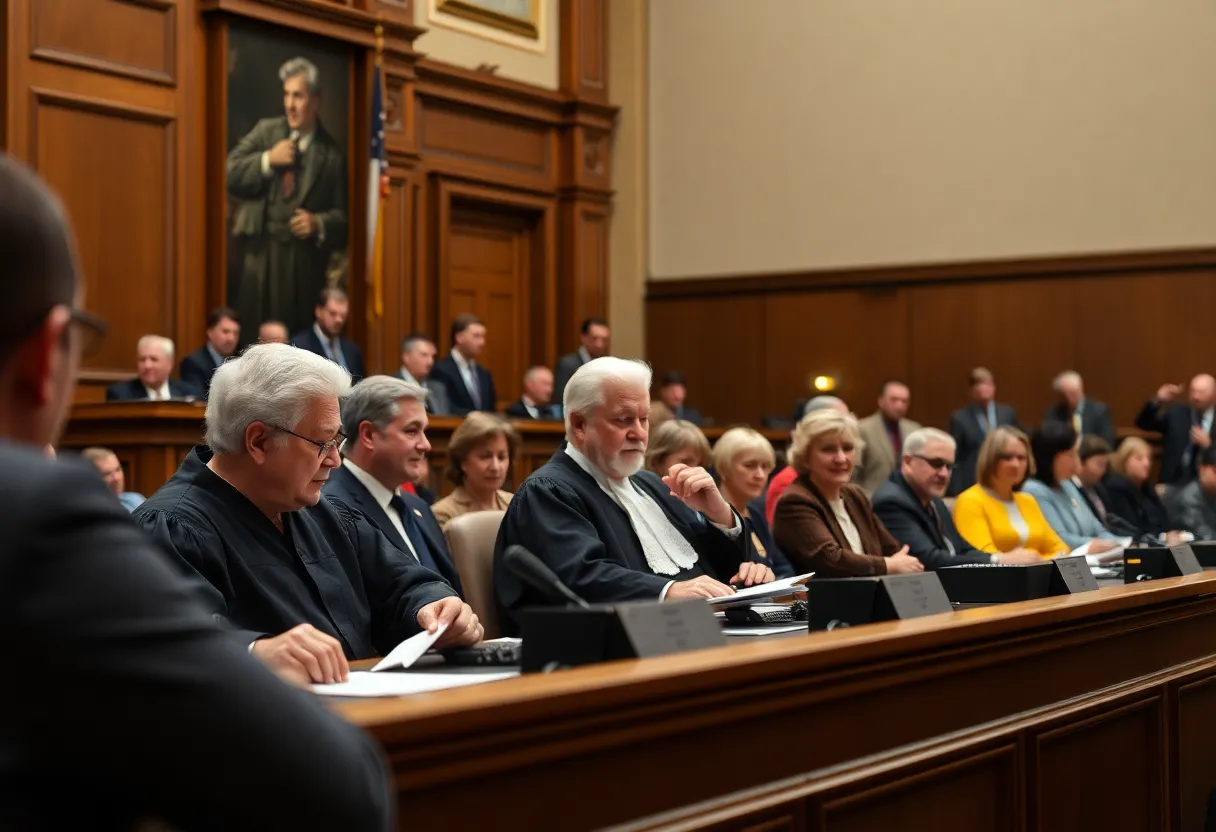News Summary
The U.S. Supreme Court has restored the voting rights of Laurel Libby, a Maine state representative, after overturning a censure related to her social media post about a transgender athlete. The unanimous decision sparked dialogue about the implications for representation and privacy rights. Libby’s case represents a significant moment in discussions surrounding the participation of transgender athletes in girls’ sports, showcasing the intersection of politics, personal rights, and legislative processes. With ongoing debates on athletic eligibility, this ruling emphasizes the complexities of rights associated with transgender individuals in sports.
Supreme Court Sets Voting Rights Right with Laurel Libby
The U.S. Supreme Court made a significant ruling this week by restoring the voting rights of Maine state representative Laurel Libby, following a contentious censure for a social media post she made. The court unanimously decided that the censure imposed on Libby should not stand, leading to cheers of victory from her supporters and a conversation about the broader implications for the rights of constituents.
A Little Background
Libby, a member of the GOP, found herself in hot water back on February 15, when she made a post identifying a transgender athlete who won a girls’ pole vault competition at a high school in Maine. The controversy started when the Maine House Speaker, Ryan Fecteau, objected to the post, raising concerns over privacy and the inclusion of a minor’s photo and name.
The Censure and Its Aftermath
Libby’s refusal to take down the post ignited a series of discussions. Fecteau initiated the censure process, which barred Libby from participating in debates and voting in the chamber. After the censure, he indicated that he would lift the punishment if Libby issued an apology, but she stood firm. This refusal ultimately led her to file a lawsuit against the censure, asserting that it curtailed her constituents’ representation in the state legislature.
A Journey to the Supreme Court
Initially, both a federal district court and the First Circuit Court of Appeals sided against Libby’s appeal. Not one to back down, she took her case to the U.S. Supreme Court, where she was eventually granted relief. In a landmark ruling, the Supreme Court reversed the decision of lower courts in a decisive 7-2 verdict, deeming Libby’s entitlement to relief from the censure “indisputably clear.”
The Reaction
Following the ruling, Libby expressed her gratitude on social media, framing it as a victory for her constituents and the principles outlined in the Constitution. However, the decision did not come without dissent. Justices Sonia Sotomayor and Ketanji Brown Jackson expressed concerns regarding the emergency relief process, indicating that they found it problematic.
The Bigger Picture
This situation has sparked a wider conversation about the participation of transgender athletes in girls’ sports, which continues to be a hot-button issue across the nation. With discussions of athletic eligibility and rights at the forefront, Libby’s case has ignited debates that resonate well beyond state lines.
State Response and Ongoing Debate
Maine’s Attorney General took a firm stance, arguing that the censure was a critical legislative action that courts should not meddle with. This tangle of opinions reached a boiling point, showing the complexity of laws and rights associated with transgender athletes. The ruling even caught the attention of the U.S. Department of Justice, which backed Libby’s lawsuit, indicating a larger trend toward governmental involvement in these matters, including a lawsuit concerning transgender athlete policies in Maine’s educational framework.
What’s Next for Laurel Libby?
Libby’s current term runs through 2026, having first been elected in 2020. Her journey sheds light on how intertwined sports, politics, and personal rights can create intricate narratives, influencing not just individual lives but impacting legislative processes as well. As the debate evolves, it will be interesting to see how Libby’s case influences future discussions surrounding the rights of transgender individuals in sports and the obligations of state legislatures in protecting those rights.
In Summary
The Supreme Court’s ruling in Laurel Libby’s case has opened the door for more inquiries into the dynamics of representation, privacy, and athlete eligibility, heralding a potentially pivotal moment in the ongoing discussion about the rights of transgender athletes. While the dust settles on this ruling, conversations will likely continue, reminding us that the debate over inclusion in sports is far from over.
Deeper Dive: News & Info About This Topic
- Fox News
- Wikipedia: Transgender and Gender Nonconforming People in Sports
- MSNBC
- Encyclopedia Britannica: Supreme Court
- CBS News
- Google Search: Laurel Libby
- Washington Post
- Google News: Laurel Libby

Author: STAFF HERE PETERSBURG WRITER
The ST PETERSBURG STAFF WRITER represents the experienced team at HEREStPetersburg.com, your go-to source for actionable local news and information in St Petersburg, Pinellas County, and beyond. Specializing in "news you can use," we cover essential topics like product reviews for personal and business needs, local business directories, politics, real estate trends, neighborhood insights, and state news affecting the area—with deep expertise drawn from years of dedicated reporting and strong community input, including local press releases and business updates. We deliver top reporting on high-value events such as Grand Prix of St. Petersburg, Localtopia, and SHINE Mural Festival. Our coverage extends to key organizations like the St. Petersburg Area Chamber of Commerce and St. Pete Downtown Partnership, plus leading businesses in finance, manufacturing, and healthcare that power the local economy such as Raymond James Financial, Jabil, and Bayfront Health St. Petersburg. As part of the broader HERE network, including HEREJacksonville.com, HEREOrlando.com, HERETallahassee.com, and HERETampa.com, we provide comprehensive, credible insights into Florida's dynamic landscape.




